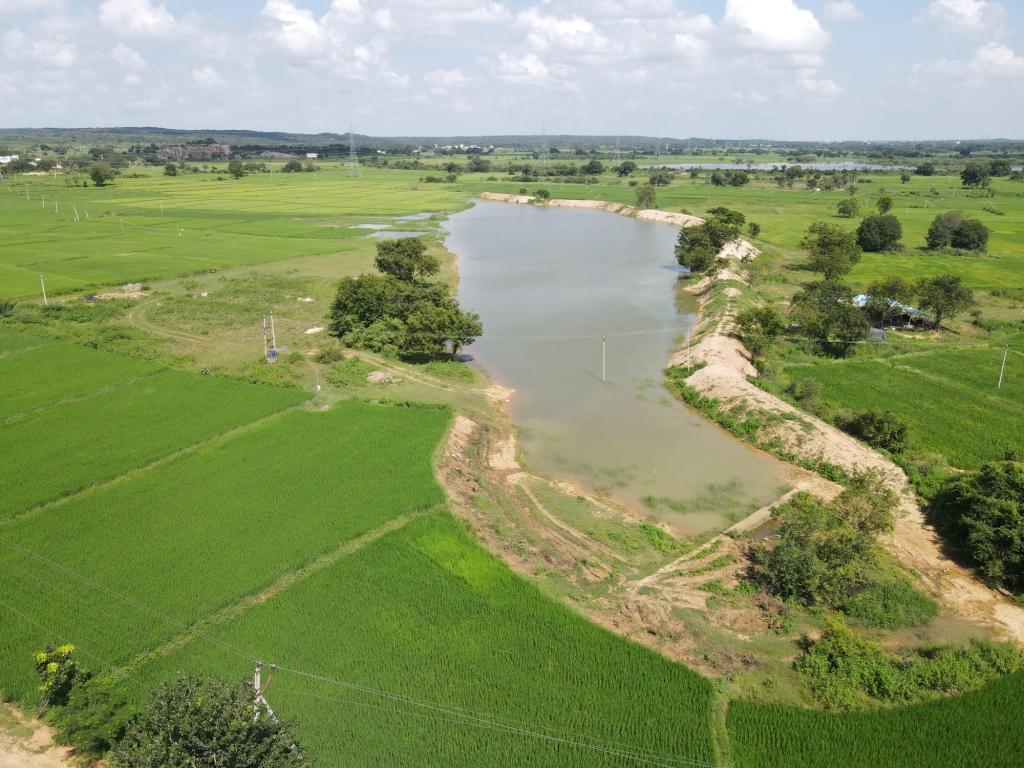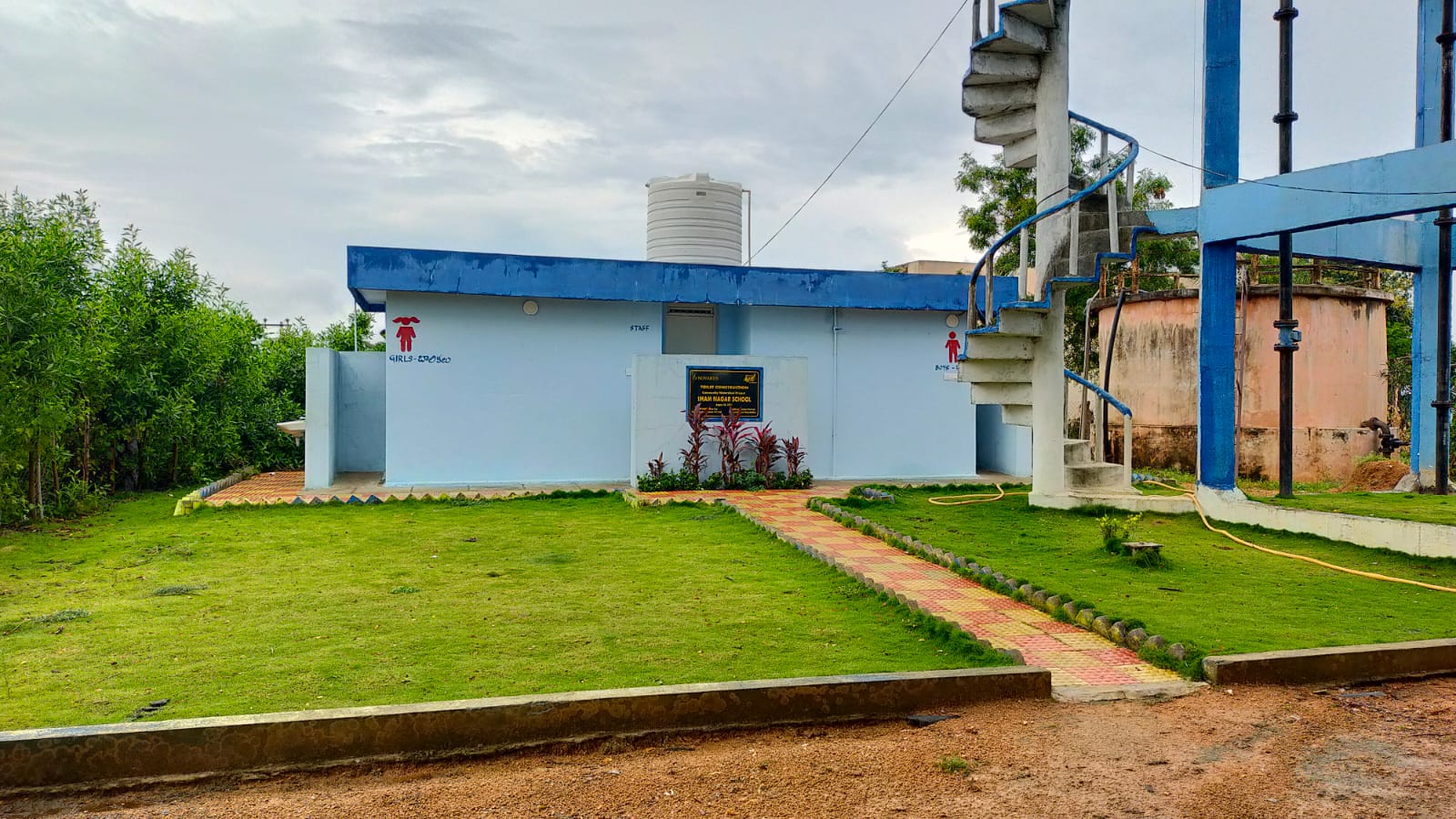In the heart of Telangana, a region plagued by the relentless challenge of water scarcity, communities have been grappling with a pressing issue. Much like many regions worldwide, the state faces recurrent droughts due to insufficient rainfall and the inadequacy of water reservoirs. These daunting challenges have left communities in dire need of water for daily sustenance and agricultural pursuits. Furthermore, groundwater levels in the state have significantly dropped over the past decade, leading to ecological imbalances and water contamination. This has resulted in waterborne diseases and concerns about water quality and availability in previously well-supplied areas.
Amidst this intertwined crisis of water scarcity and public well-being, Novartis India, a pharmaceutical major, recognized the critical link between health and clean water. The company embarked on a transformative mission known as the Novartis Watershed Project, aiming to alleviate water scarcity while improving the region's overall health and quality of life.
Subsequently, this initiative has already achieved significant milestones, improving the livelihoods of over 11,000 individuals and constructing 18 water structures for rainwater harvesting.
In an insightful interview with TheCSRUniverse, Ms. Vaishali Iyer, Country Head - Communications, Patient Engagement, and CSR, Novartis India, provides a comprehensive overview of the Watershed Project. She delves into the project's multifaceted approach, emphasizing its impact on community empowerment, ecological sustainability, and the well-being of the people it serves. Additionally, she highlights the crucial role that corporations can play in addressing complex societal challenges through initiatives like this one.
Scroll down to read the full interview below.
Q&A
Q. How has Novartis’ Watershed Project impacted water scarcity in Telangana and the local community? Please share insights into Novartis' sustainability goals and initiatives.
A. At Novartis, we have a strong commitment to sustainable development. As a global organization, we acknowledge the responsibility and opportunity we possess to effect positive social change. We are on a continuous journey to channel our efforts toward a larger purpose and create a better future for all. Our commitment to long-term solutions underscores our dedication to the well-being of communities. CSR for Novartis in India is an extension of these philosophies.
Globally, one of our environmental, social, and governance (ESG) goals is to achieve water neutrality by 2030, a commitment which is a fundamental pillar Corporate Social Responsibility (CSR) strategy at Novartis in India. We understand the link between the health of our planet and the health of our patients. Our ambition is to be a catalyst to drive positive impact in environmental sustainability.
The watershed development project in Telangana exemplifies our deep-rooted commitment to the countries in which we operate. Recognizing the intrinsic link between health and water, we strive to act as responsible water stewards in all our locations, working diligently to attain water sustainability and ensure sufficient and safe water access.
The project undertaken with our implementation partner National Agro Foundation exemplifies this commitment by enhancing water accessibility to drive long term impact.
Thus far, the project has been able to impact over 11,000 lives, build 18 water structures to harvest and store rainwater, and see a positive in the livelihood of the community. Moreover, our efforts in empowering farmers with knowledge and skills have resulted in enhanced agricultural productivity and increased income.
By fostering entrepreneurship and supporting women-owned small businesses through microfinancing, we contribute to sustainable economic growth and poverty alleviation.
This innovative initiative follows a comprehensive and holistic model that focuses on meeting community needs, minimizing water demand, encouraging economic development, and fostering community well-being from an overarching perspective.
Q. What are the broader objectives of the Watershed Project beyond water conservation, and how does it integrate with the ecosystem?
 A. Our purpose, of improving and extending people's lives by reimagining medicine, inherently includes a social dimension. Our investment in the planet reflects our commitment to communities.
A. Our purpose, of improving and extending people's lives by reimagining medicine, inherently includes a social dimension. Our investment in the planet reflects our commitment to communities.
While water sustainability is a primary focus, the project takes a holistic approach to address multiple dimensions of community development. This project is by the community, for the community and deeply embedded within the community. Through this, we aim to drive long-term meaningful impact where the community embodies the successes of the project as their own.
This innovative initiative follows a 360° model of sustainability using a four-pronged approach:
• Restoring adequate supply: Fulfilling the needs of the community by increasing the water supply by building water resources like ponds, dams, and water tankers
• Encouraging environmental wellbeing: Minimize water demand by teaching farmers sustainable and efficient water utilization techniques. The project has provided training to farmers on efficient water utilization techniques and reduced pesticide use, leading to a 20%-30% increase in crop intensity and an improvement in farm outcomes. The project promotes the adoption of efficient irrigation techniques like drip irrigation and encourages conservation agriculture practices to reduce water consumption and enhance soil health. Recognizing the importance of environmental preservation, the project also contributes to the overall ecosystem. It actively supports the planting of trees, recognizing their role in carbon sequestration and the promotion of biodiversity among flora and fauna.
• Economic empowerment: Encouraging economic development by helping farmers maximize profits and providing microfinancing to women-owned small businesses. We provide support to women-owned small businesses through microfinancing, fostering their growth and success. Our aim is to empower the community to where individuals can flourish socially and economically.
• Focus on community well-being: Finally, a focus on community well-being through clean drinking water, toilets, handwashing stations, and improving the school infrastructure. Through the project we have also been able to contribute towards enhancing much-needed infrastructure such as clean drinking water facilities, handwashing stations, toilets, biogas units, and solar streetlights. Additionally, we also provide learning materials and sports equipment to schoolchildren, promoting well-rounded development.
This holistic approach ensures that the project's positive impact extends beyond water, encompassing the well-being of the environment as well as the communities.
Q. How has the Watershed Project supported women's self-help groups and women-led businesses in the community?
 A. In addition to addressing water scarcity challenges, the project has also focused on empowering women in the community. The project has promoted women's self-help groups (SHGs) and women-led businesses by providing microfinancing solutions where we provide small loans to women to help further or kickstart their businesses. The SHG has disbursed INR 13 lakh so far, which women have used to start new or expand existing businesses like grocery shops, clothing stores, tailoring, and livestock rearing.
A. In addition to addressing water scarcity challenges, the project has also focused on empowering women in the community. The project has promoted women's self-help groups (SHGs) and women-led businesses by providing microfinancing solutions where we provide small loans to women to help further or kickstart their businesses. The SHG has disbursed INR 13 lakh so far, which women have used to start new or expand existing businesses like grocery shops, clothing stores, tailoring, and livestock rearing.
Let me give you an example of the on-ground impact that the project has been able to create. Back in 2019, I met a woman who used to run an informal tea stall under a banyan tree. The project provided her a platform to uplift herself and her family and enabled her to run a full-blown tiffin service increasing her income from Rs 5,000 a month to Rs 20,000 a month. Today, she is also thinking about earning enough money to go back to school and completing her engineering degree. There are many such stories of empowerment, ambition to fulfil latent dreams and independence that the women of this community can share – a true testament to the impact of this initiative.
Q. What recommendations does Novartis have for addressing water scarcity sustainably in India?
A. We are on a journey. Our understanding of the issues and solutions is constantly evolving. However, the transformation we have witnessed is extraordinary. From barren lands to overflowing ponds, the speed and scale of the changes in the community always leaves us in awe.
We, at Novartis, believe in approaching CSR from a long-term holistic perspective. This project as well follows the same principles and has made great impact on the community.
Apart from water conservation and management, we have seen that it is important to build capabilities within the community to empower them to make the project their own.
Based on our experience with the Watershed Project, which emphasizes sustainable agriculture practices and enhancing water accessibility in rural areas, we recommend engaging communities, fostering collaboration among stakeholders, promoting water reuse, and recycling, and supporting sustainable agricultural practices to address water scarcity sustainably in India. By adopting these measures, we can effectively manage water resources, raise awareness, and develop innovative solutions to mitigate the impact of water scarcity on communities and the environment.
Q. How can government policies and private initiatives work together to address water scarcity and promote sustainable water management practices in India?
A. Water scarcity poses a significant threat to the well-being and progress of communities worldwide. The issue is further exacerbated by the impacts of climate change, compelling governments to seek innovative and collaborative solutions to combat water stress.
Governments are recognizing the need for comprehensive strategies that integrate climate change considerations into water resource management. By adopting innovative approaches and fostering collaboration among various stakeholders, they are taking measures to alleviate water stress and ensure sustainable water access for all.
We appreciate the Indian government's efforts in implementing and revising policies to encourage organizations to focus on CSR initiatives. It is truly inspiring to witness the partnerships and collaboration across the ecosystem to implement innovative water conservation measures.
At Novartis, we firmly believe in adopting a comprehensive and long-term perspective when it comes to corporate social responsibility (CSR). Our initiatives are designed to address the real challenges faced by communities and to foster sustainable livelihoods that can help alleviate generational poverty.
By promoting efficient water usage in agriculture and industry, companies like ours are endeavouring to address water scarcity challenges. The positive ripple effects of these initiatives extend beyond water conservation, leading to significant socio-economic development and upliftment of the communities involved.
Q. What role do international organizations, corporations, and civil society organizations play in supporting sustainable water management practices in developing countries?
A. We understand that initiatives like ours which intend to make a large-scale impact require a multi-stakeholder approach, and therefore, the role of international organizations, corporations, and civil society organizations becomes crucial. By collaborating and leveraging their respective strengths, international organizations, corporations, and civil society organizations contribute significantly to supporting sustainable water management practices in developing countries. Their combined efforts foster environmental sustainability, improve water access, enhance community livelihoods, and contribute to the overall well-being of societies.
Q. What key challenges and barriers have you encountered in implementing sustainable water management practices in India, and how have you addressed them?
A. Our dedication to communities serves as the driving force behind the Watershed Development Project. Recognizing water as a fundamental and indispensable element for humanity and well-being, we have undertaken this initiative with the aim of making a significant and lasting impact, and therefore strive to address any challenges that come along the way.
 Water security in India faces several issues and challenges that threaten the sustainability and development of the country. These include over-extraction of groundwater, water pollution, inadequate distribution, lack of proper water management, and climate change.
Water security in India faces several issues and challenges that threaten the sustainability and development of the country. These include over-extraction of groundwater, water pollution, inadequate distribution, lack of proper water management, and climate change.
Overdependence on groundwater for irrigation purposes is a significant challenge. The lack of infrastructure, including water storage facilities and irrigation systems, can limit the adoption of sustainable water management practices. Developing adequate infrastructure and providing access to water storage facilities can help overcome this challenge.
One of the key challenges for us was building trust with the local community, particularly in rural areas. We overcame this by engaging with community leaders, such as the sarpanch, and involving them in the decision-making process. We fulfilled their immediate pertinent needs like building toilets in schools and providing access to clean water while showcasing a roadmap for the future.
Building trust and relationships with the community can help ensure their participation and ownership of the project, which can lead to long-term success. By providing sustainable solutions to the water challenges faced by these communities, we look forward to creating meaningful change and contributing to their overall health and prosperity.
Q. Could you share more about National Agro Foundation's role in the Watershed Project and how it contributes to achieving the project's objectives?
A. The idea behind the Watershed Project was to promote sustainable water management practices which are specifically designed to bring long-term benefits to communities. National Agro Foundation (NAF), our implementation and execution partner has brought invaluable knowledge and on-ground capabilities that have made the project what it is.
This collaboration has been significant as we have been able to work hand in hand combining our collective expertise, resources, and commitment to achieve the Watershed Project's objectives. The partnership has been pivotal in addressing water scarcity, promoting sustainable agriculture, empowering communities, and enhancing overall well-being in the project areas.
Q. How does Novartis plan to scale up and replicate the Watershed Project to promote sustainable water management practices and inclusive development?
A. We aim to be water stewards wherever we operate, striving for water sustainability and ensuring sufficient and safe water access. Through research, we identified that the Krishna River basin in Telangana, which serves as the water source for our water consumption at Genome Valley and the Novartis Corporate Centre (NOCC) in Hyderabad, was home to many water-stressed communities relying on agriculture as their primary source of income. These communities were trapped in a vicious cycle where the lack of water resulted in income loss. We saw the opportunity to address this problem and bring about positive change in their lives.
Since its initiation in 2021, the Watershed Project has made a remarkable impact in the Medak district of Telangana. The project has brought about significant positive changes in the lives of the communities it has served. Through the implementation of sustainable practices, beneficiaries have experienced increased incomes, thriving businesses, improved health outcomes, and enhanced educational facilities, including the provision of clean toilets and handwashing stations in schools. These improvements have resulted in improved attendance and better health for children in the community.
Building upon the successes and lessons learned, we have embarked on a new venture in 2022, extending our efforts to the district of Yadadri Bhuvanagiri in Telangana. Through scaling up and replicating the Watershed Project, our aim is to expand the reach of its comprehensive sustainability model to additional communities, fostering improved livelihoods in rural areas.
Currently, we have reached 12 villages, and by further expanding the reach of the Watershed Project, we strive to make an even more profound impact, uplifting rural communities and contributing to the achievement of the United Nations' Sustainable Development Goals.
We remain committed to expanding the reach of the Watershed Project, as part of our ongoing dedication to driving positive social and environmental change.





 A. Our purpose, of improving and extending people's lives by reimagining medicine, inherently includes a social dimension. Our investment in the planet reflects our commitment to communities.
A. Our purpose, of improving and extending people's lives by reimagining medicine, inherently includes a social dimension. Our investment in the planet reflects our commitment to communities. A. In addition to addressing water scarcity challenges, the project has also focused on empowering women in the community. The project has promoted women's self-help groups (SHGs) and women-led businesses by providing microfinancing solutions where we provide small loans to women to help further or kickstart their businesses. The SHG has disbursed INR 13 lakh so far, which women have used to start new or expand existing businesses like grocery shops, clothing stores, tailoring, and livestock rearing.
A. In addition to addressing water scarcity challenges, the project has also focused on empowering women in the community. The project has promoted women's self-help groups (SHGs) and women-led businesses by providing microfinancing solutions where we provide small loans to women to help further or kickstart their businesses. The SHG has disbursed INR 13 lakh so far, which women have used to start new or expand existing businesses like grocery shops, clothing stores, tailoring, and livestock rearing. Water security in India faces several issues and challenges that threaten the sustainability and development of the country. These include over-extraction of groundwater, water pollution, inadequate distribution, lack of proper water management, and climate change.
Water security in India faces several issues and challenges that threaten the sustainability and development of the country. These include over-extraction of groundwater, water pollution, inadequate distribution, lack of proper water management, and climate change.












.jpg)



